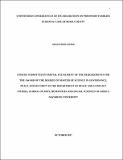| dc.description.abstract | Prison punishment is the most comprehensive social control, regulation, and crime prevention
mechanism. The purpose of this study was to examine the unintended socio economic impacts of
incarceration on prisoners’ families and look at the prospects of it causing criminal replacement
and finally propose possible remedies. This was achieved through four objectives:to evaluate the
social impacts of incarceration on prisoner’s families; to evaluate the economic impacts of
incarceration on prisoner’s families;to establish whether there is a relationship between these
socio-economic impacts of incarceration and adaptation to criminal life by family members of
the incarcerated; and finally to propose policy measures to be put in place to address these
challenges. This study employed a mix of quasi experimental design and non
experimentaldesign. The approach adopted by the study was both qualitative and
quantitative.The study targeted a population of 500 inmates currently held at Busia GoK Prison
and their family members. A sample of 50 inmates was used in the study. Additionally, the study
had five focus group discussions of prisoner’s family members with each focus group discussion
consisting of seven to ten members.This study established thatstigma was the most reported
social impact (42, 84.0%) followed by hostility from community members (36, 72%), children
being bullied at school (34, 68.0%), isolation (30, 60.0%) and loneliness (15, 30.0%).The
negative economic effects of incarceration on families included financial challenges (48, 98.0%),
loss of jobs (37, 75.5%), loss of family properties (29, 59.2%), reduced family income (41,
83.7%) among others. Overall, the survey recorded a family criminal replacement among 24
respondents, thus a prevalence of 48.0%.This study established that socio economic impacts of
incarceration that had a significantly higher proportion of family criminal replacement among
respondents included stigma (p=0.028), Isolation of families (p<0.001), children being bullied at
school (p = 0.026), disruption of the lives of families (p=0.024), hostility from community
members (p=0.003)loss of jobs (p=0.037 and lowered the earnings (p= 0.028). Based on these
findings this study recommended that the Kenya Prison Services, nongovernmental organisations
and the Ministry of Education should establish civic education programmes to demystify
imprisonment to prevent stigmatisation and unfair treatment of the family members of the
incarcerated by the community. The study further recommends that the government through the
Ministry of Home Affairs should offer financial support that can meet the basic needs of food,
water and shelter to families of the incarcerated. | en_US |

